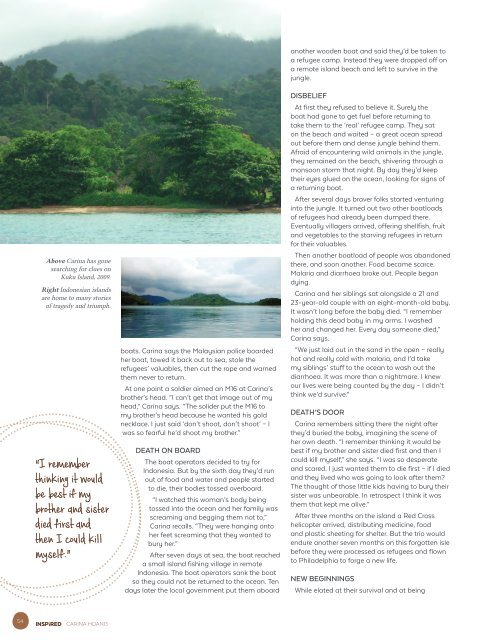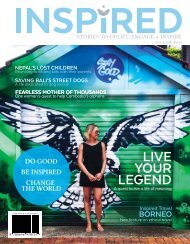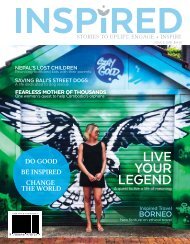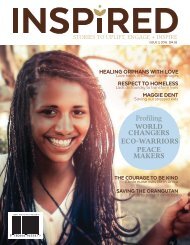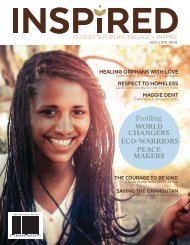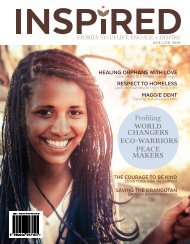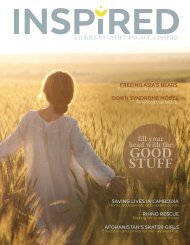Inspired Magazine
Profiling world changers, eco-warriors, peace makers
Profiling world changers, eco-warriors, peace makers
Create successful ePaper yourself
Turn your PDF publications into a flip-book with our unique Google optimized e-Paper software.
Above Carina has gone<br />
searching for clues on<br />
Kuku Island, 2009.<br />
Right Indonesian islands<br />
are home to many stories<br />
of tragedy and triumph.<br />
“I remember<br />
thinking it would<br />
be best if my<br />
brother and sister<br />
died first and<br />
then I could kill<br />
myself.”<br />
boats. Carina says the Malaysian police boarded<br />
her boat, towed it back out to sea, stole the<br />
refugees’ valuables, then cut the rope and warned<br />
them never to return.<br />
At one point a soldier aimed an M16 at Carina’s<br />
brother’s head. “I can’t get that image out of my<br />
head,” Carina says. “The solider put the M16 to<br />
my brother’s head because he wanted his gold<br />
necklace. I just said ‘don’t shoot, don’t shoot’ – I<br />
was so fearful he’d shoot my brother.”<br />
DEATH ON BOARD<br />
The boat operators decided to try for<br />
Indonesia. But by the sixth day they’d run<br />
out of food and water and people started<br />
to die, their bodies tossed overboard.<br />
“I watched this woman’s body being<br />
tossed into the ocean and her family was<br />
screaming and begging them not to,”<br />
Carina recalls. “They were hanging onto<br />
her feet screaming that they wanted to<br />
bury her.”<br />
After seven days at sea, the boat reached<br />
a small island fishing village in remote<br />
Indonesia. The boat operators sank the boat<br />
so they could not be returned to the ocean. Ten<br />
days later the local government put them aboard<br />
another wooden boat and said they’d be taken to<br />
a refugee camp. Instead they were dropped off on<br />
a remote island beach and left to survive in the<br />
jungle.<br />
DISBELIEF<br />
At first they refused to believe it. Surely the<br />
boat had gone to get fuel before returning to<br />
take them to the ‘real’ refugee camp. They sat<br />
on the beach and waited – a great ocean spread<br />
out before them and dense jungle behind them.<br />
Afraid of encountering wild animals in the jungle,<br />
they remained on the beach, shivering through a<br />
monsoon storm that night. By day they’d keep<br />
their eyes glued on the ocean, looking for signs of<br />
a returning boat.<br />
After several days braver folks started venturing<br />
into the jungle. It turned out two other boatloads<br />
of refugees had already been dumped there.<br />
Eventually villagers arrived, offering shellfish, fruit<br />
and vegetables to the starving refugees in return<br />
for their valuables.<br />
Then another boatload of people was abandoned<br />
there, and soon another. Food became scarce.<br />
Malaria and diarrhoea broke out. People began<br />
dying.<br />
Carina and her siblings sat alongside a 21 and<br />
23-year-old couple with an eight-month-old baby.<br />
It wasn’t long before the baby died. “I remember<br />
holding this dead baby in my arms. I washed<br />
her and changed her. Every day someone died,”<br />
Carina says.<br />
“We just laid out in the sand in the open – really<br />
hot and really cold with malaria, and I’d take<br />
my siblings’ stuff to the ocean to wash out the<br />
diarrhoea. It was more than a nightmare. I knew<br />
our lives were being counted by the day – I didn’t<br />
think we’d survive.”<br />
DEATH’S DOOR<br />
Carina remembers sitting there the night after<br />
they’d buried the baby, imagining the scene of<br />
her own death. “I remember thinking it would be<br />
best if my brother and sister died first and then I<br />
could kill myself,” she says. “I was so desperate<br />
and scared. I just wanted them to die first – if I died<br />
and they lived who was going to look after them?<br />
The thought of those little kids having to bury their<br />
sister was unbearable. In retrospect I think it was<br />
them that kept me alive.”<br />
After three months on the island a Red Cross<br />
helicopter arrived, distributing medicine, food<br />
and plastic sheeting for shelter. But the trio would<br />
endure another seven months on this forgotten isle<br />
before they were processed as refugees and flown<br />
to Philadelphia to forge a new life.<br />
NEW BEGINNINGS<br />
While elated at their survival and at being<br />
54<br />
CARINA HOANG


